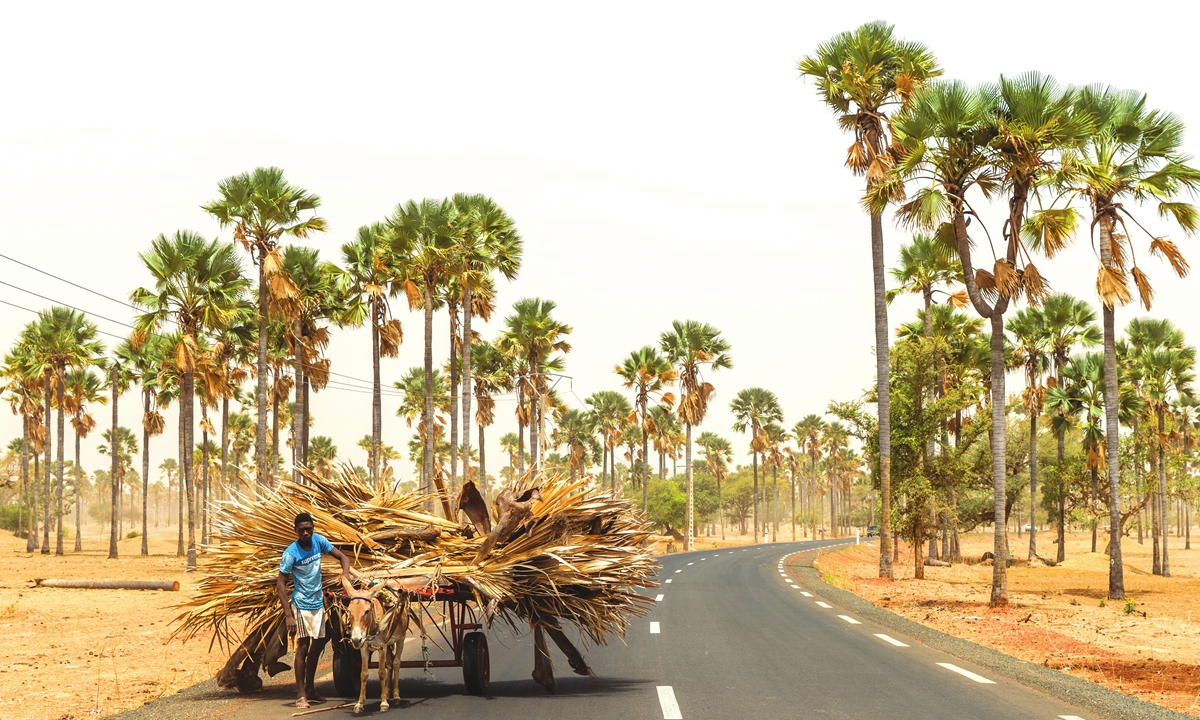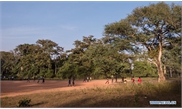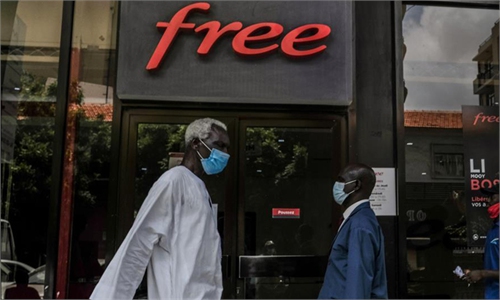Herds of cows meander across the one-lane highway that leads down Senegal's coast to Mbodiene, a farming village where singer Akon plans to build a futuristic city.
Designs of shiny, pinkish buildings that bend and curve like waves would look at home in any sci-fi movie.
Architect Hussein Bakri has carved out space for a parking lot - for flying cars.
Akon has said the city will attract tourists and create thousands of jobs. US-based firm KE International said it plans to start construction on the $6 billion project in 2021.But in Senegal, a West African country where villagers drive horse carts on unpaved roads, the proposal has met with suspicion and bemusement.

Questions about land rights, financing and feasibility remain unanswered.
"Akon came to meet us. He said he'll do this. It could be real or not real - but I think it's real," said Magueye Ndao, mayor of Ngueniene, the municipality containing Mbodiene and other villages where Akon City will be built.
The list of promises is long: a training center and jobs for youth, improved schools and health services, and an extension of the water, sanitation and electricity networks.
"We welcome this project with open arms and pray that everything Akon told us will be realized," said Ndao. If history is any guide, they will most likely be let down, said Xavier Ricou, an architect and former director at APIX, Senegal's agency for promoting investment and major projects.
"During the 15 years or so that I worked at APIX, I saw proposals from people who wanted to make cities all over," said Ricou, revealing how millions of dollars were spent on advanced plans for cities that were then never built.
They were mostly abandoned, he said, due to inadequate funding, a change of government or some unknown reason.
"I think nothing will happen," said Ricou.
Akon spent part of his childhood in Senegal before moving to the US. In 2014, he launched his first big philanthropic initiative, the solar power project Akon Lighting Africa.
At the project site of a youth center built separate from Akon City, a single stone sits on a pedestal in an empty field, untouched since Akon and the tourism minister held a stone-laying ceremony to kick off the project in August.
Of the $6 billion dollar budget, $4 billion has been secured from investors, including Kenyan businessman Julius Mwale, said Paul Martin, director of the project at KE International, an engineering and infrastructure consulting firm. Martin said he could not provide more details due to confidentiality.
Mwale's office declined to answer questions for this story.
Led from outside
Akon City was designed "for the people," said Dubai-based architect Bakri, who began visiting Senegal several years ago.
With two resorts, four or five hotels, a hospital and a tech park, Akon City will be a destination for both residents and the global elite, said Bakri. Akon has also said he hopes it will be a "home back home" for African Americans.
"The studies that were done were not in collaboration with the commune of Ngueniene," said Pape Massamba Thiaw, a municipal councilor and president of the youth commission for Ngueniene. He expressed concern about the disconnect between Western and Senegalese culture, and other social and environmental issues.
He said he wants to ensure young Senegalese get to work in offices, not just doing construction or collecting trash.
Martin said KE International will ensure contractors allocate 90 percent of jobs to residents and will build colleges to train them in new skills.
Although Martin said environmental and social impact studies had been done, Thiaw said that no study had engaged the community or been shared with its leaders.
"Since the project is not 100 percent led by the commune of Ngueniene, there are bound to be fears and worries about it," Thiaw told Reuters.
Hectares of concern
The land earmarked for Akon City can no longer be farmed as it is heavy with clay and saltwater, said Mayor Ndao.
In 2009 it was ceded to the state, for future tourism development by SAPCO. But many villagers who were owed compensation were never paid, said government sources.
Reuters found the government declared in 2014 that 1.8 billion CFA Francs ($3.35 million) was owed to 385 people for a total of 504 hectares in Mbodiene and 110 hectares in nearby Pointe Sarene.
A local government employee not authorized to speak on the topic said a little less than half the money has been paid.
"We have paid one part around Pointe Sarene. We have tried to priorities so that the Mbodiene villagers are paid," said Aliou Sow, Director-General of SAPCO.
The first phase of Akon City will be built on 55 hectares, said Bakri, but the long-term plan is to use all 504 hectares in Mbodiene. But a deal with SAPCO has only been finalized for the 55 hectares, he said.
KE International, whose website says the city will be located on 800 hectares, declined to comment on former landowners' compensation.
As for the plans' feasibility, architect Bakri said he designs based on new technology that he believes will land in 25 years - including flying cars.
"If that was happening in Dubai you would say, okay well that's a new phase of architecture," he said.
"Why not in Africa?"
Designs of shiny, pinkish buildings that bend and curve like waves would look at home in any sci-fi movie.
Architect Hussein Bakri has carved out space for a parking lot - for flying cars.
Akon has said the city will attract tourists and create thousands of jobs. US-based firm KE International said it plans to start construction on the $6 billion project in 2021.But in Senegal, a West African country where villagers drive horse carts on unpaved roads, the proposal has met with suspicion and bemusement.

A view in Senegal Photo: VCG
Questions about land rights, financing and feasibility remain unanswered.
"Akon came to meet us. He said he'll do this. It could be real or not real - but I think it's real," said Magueye Ndao, mayor of Ngueniene, the municipality containing Mbodiene and other villages where Akon City will be built.
The list of promises is long: a training center and jobs for youth, improved schools and health services, and an extension of the water, sanitation and electricity networks.
"We welcome this project with open arms and pray that everything Akon told us will be realized," said Ndao. If history is any guide, they will most likely be let down, said Xavier Ricou, an architect and former director at APIX, Senegal's agency for promoting investment and major projects.
"During the 15 years or so that I worked at APIX, I saw proposals from people who wanted to make cities all over," said Ricou, revealing how millions of dollars were spent on advanced plans for cities that were then never built.
They were mostly abandoned, he said, due to inadequate funding, a change of government or some unknown reason.
"I think nothing will happen," said Ricou.
Akon spent part of his childhood in Senegal before moving to the US. In 2014, he launched his first big philanthropic initiative, the solar power project Akon Lighting Africa.
At the project site of a youth center built separate from Akon City, a single stone sits on a pedestal in an empty field, untouched since Akon and the tourism minister held a stone-laying ceremony to kick off the project in August.
Of the $6 billion dollar budget, $4 billion has been secured from investors, including Kenyan businessman Julius Mwale, said Paul Martin, director of the project at KE International, an engineering and infrastructure consulting firm. Martin said he could not provide more details due to confidentiality.
Mwale's office declined to answer questions for this story.
Led from outside
Akon City was designed "for the people," said Dubai-based architect Bakri, who began visiting Senegal several years ago.
With two resorts, four or five hotels, a hospital and a tech park, Akon City will be a destination for both residents and the global elite, said Bakri. Akon has also said he hopes it will be a "home back home" for African Americans.
"The studies that were done were not in collaboration with the commune of Ngueniene," said Pape Massamba Thiaw, a municipal councilor and president of the youth commission for Ngueniene. He expressed concern about the disconnect between Western and Senegalese culture, and other social and environmental issues.
He said he wants to ensure young Senegalese get to work in offices, not just doing construction or collecting trash.
Martin said KE International will ensure contractors allocate 90 percent of jobs to residents and will build colleges to train them in new skills.
Although Martin said environmental and social impact studies had been done, Thiaw said that no study had engaged the community or been shared with its leaders.
"Since the project is not 100 percent led by the commune of Ngueniene, there are bound to be fears and worries about it," Thiaw told Reuters.
Hectares of concern
The land earmarked for Akon City can no longer be farmed as it is heavy with clay and saltwater, said Mayor Ndao.
In 2009 it was ceded to the state, for future tourism development by SAPCO. But many villagers who were owed compensation were never paid, said government sources.
Reuters found the government declared in 2014 that 1.8 billion CFA Francs ($3.35 million) was owed to 385 people for a total of 504 hectares in Mbodiene and 110 hectares in nearby Pointe Sarene.
A local government employee not authorized to speak on the topic said a little less than half the money has been paid.
"We have paid one part around Pointe Sarene. We have tried to priorities so that the Mbodiene villagers are paid," said Aliou Sow, Director-General of SAPCO.
The first phase of Akon City will be built on 55 hectares, said Bakri, but the long-term plan is to use all 504 hectares in Mbodiene. But a deal with SAPCO has only been finalized for the 55 hectares, he said.
KE International, whose website says the city will be located on 800 hectares, declined to comment on former landowners' compensation.
As for the plans' feasibility, architect Bakri said he designs based on new technology that he believes will land in 25 years - including flying cars.
"If that was happening in Dubai you would say, okay well that's a new phase of architecture," he said.
"Why not in Africa?"




